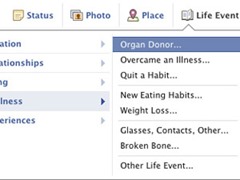By Kathleen Struck, Senior Editor, MedPage Today
Published: June 18, 2013
Reviewed by Robert Jasmer, MD; Associate Clinical Professor of Medicine, University of California, San Francisco and Dorothy Caputo, MA, BSN, RN, Nurse Planner
Action Points
- Online registration rates in the U.S. increased dramatically after the Facebook organ donor initiative.
- Note that the study raises the possibility that social media might be effectively utilized in other refractory public health problems in which communication and education are essential.
Despite years of media and public service campaigns appealing for organ donations, donor rates remained static while demand increased -- until Facebook, researchers reported.
On May 1, 2012, the social media website launched its organ donor initiative that allowed users to change their status to indicate "organ donor," triggering a link to their official state donor registry. On that day, there were 13,054 new online registrations, representing a 21.1-fold increase over the baseline average of 616 registrations daily, according to Andrew Cameron, MD, PhD, of the Johns Hopkins University School of Medicine, and colleagues.
The first-day effect ranged from 6.9-fold in Michigan to 108.9-fold in Georgia, with registration rates remaining elevated over the subsequent 12 days, they wrote online in the American Journal of Transplantation.
During the same time period, organ donor registrations through motor vehicle divisions (DMV) saw no increases, Cameron and colleagues noted.
However, Cameron cautioned in a statement that "the bump we saw did diminish over weeks, implying that more work is needed to assure sustainability or 'virality' in this case."
Nonetheless, "novel applications of social media may prove effective in increasing organ donation rates and likewise might be utilized in other refractory public health problems in which communication and education are essential," they wrote.
Registrations totaled 39,818 over the 13-day study period, 32,958 more than would have been expected from the baseline registration rate, researchers stated.
Before the advent of social media, organ donation awareness and registration was done through school-based campaigns, work site events, and at the DMV, the authors pointed out, leading to about 100 million people in the U.S. signing up as donors.
"While this number represents a significant accomplishment, it still amounts to only around one-third of the country's population and has proved inadequate to meet the need of the growing number added to transplant waitlists," they explained.
Facebook collaborated with members of the transplant team at Johns Hopkins, the Living Legacy Foundation of Baltimore, and Donate Life America, to allow specification of organ donor designation on their "Timeline" platform.
Cameron and colleagues then studied the number of Facebook organ donor profile updates for the month of May 2012. Data were available for online registration for 43 of 50 states and the District of Columbia. Alaska, Delaware, North Dakota, New Jersey, Pennsylvania, South Dakota, and West Virginia were excluded.
DMV data were available for Michigan, Montana, Texas and Washington for three days in early May 2012.
States with higher online registration rates before the Facebook organ donor initiative had higher rates of online registration after the initiative was introduced, the researchers stated. However, they had a lower proportional increase (a lower Facebook effect) than states with lower rates of online registration before the Facebook organ donor initiative was begun, they wrote.
The association between baseline registration and registration after the initiative was suggestive, but not statistically significant, with one additional registration per day per million people during baseline period associated with four additional registrations per million people on May 1 (95% CI minus 0.3-8.3, P=0.10).
Conversely, one additional registration per day per million people during baseline period was associated with a decrease in Facebook effect of 5.8 (95% CI, minus 8.7 -minus 3.0, P<0.001).
Study limitations included unknown durability of the Facebook effect, the authors wrote, and years will be required to register an increase in deceased organ donations from the social media effort. Also, the observational approach does not specify the extent donor registration was increased because of social versus conventional media.
"The next challenge for efforts like the organ donor initiative will be utilization of social media applications like Facebook, Twitter, YouTube, or Instagram more effectively and more durably," they concluded.
The authors had no conflicts to report.
Primary source: American Journal of Transplantation
Source reference:
Cameron A, et al "Social media and organ donor registration: The Facebook effect" Am Journal Transplantation 2013; DOI: 10.1111/ajt.12312.

No comments:
Post a Comment